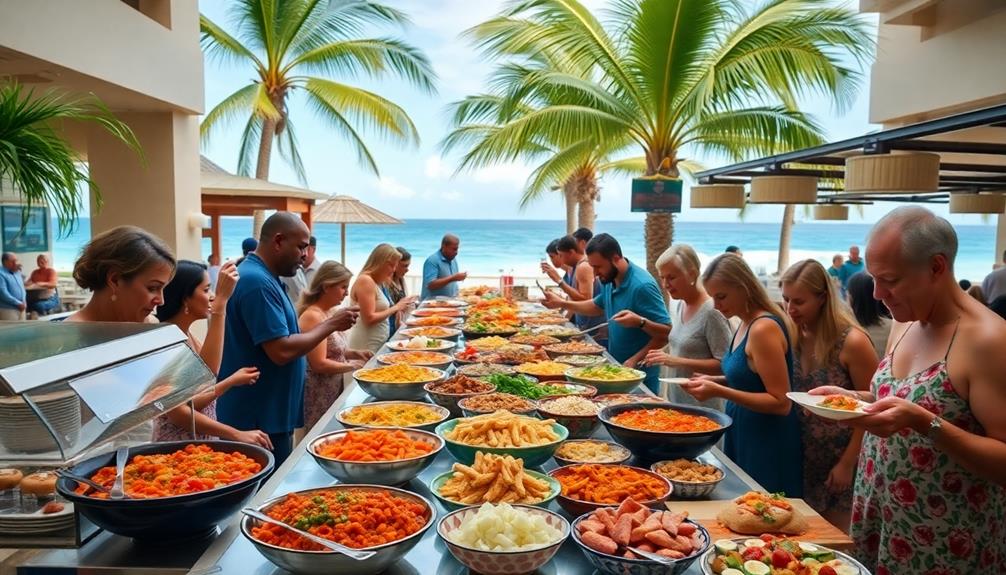When you're at an all-inclusive resort, your food choices are shaped by various psychological factors. The abundance of options can overwhelm you, leading to mindless eating and overindulgence. Social settings play a big role too; dining with others often encourages you to eat more than usual. Visual appeal and attractive presentations tempt you further. You might feel a false sense of control with so many choices, which can lead to decision fatigue. By being aware of these influences and practicing mindful eating, you can enjoy your experience without compromising your goals. Discover more about how to navigate these choices effectively.
Key Takeaways
- Abundance of food options in all-inclusive resorts can lead to decision fatigue, resulting in mindless eating and overconsumption.
- Social dynamics in group settings encourage increased consumption, often leading to indulgent eating behaviors among vacationers.
- Visual appeal of dishes and attractive presentations can trigger impulsive eating, complicating mindful food choices.
- The illusion of control created by buffet variety may mask true influences, leading to overindulgence and disregard for hunger cues.
- Recognizing psychological triggers and applying mindful eating strategies can help guests make healthier food choices while enjoying their dining experiences.
Understanding Food Choices
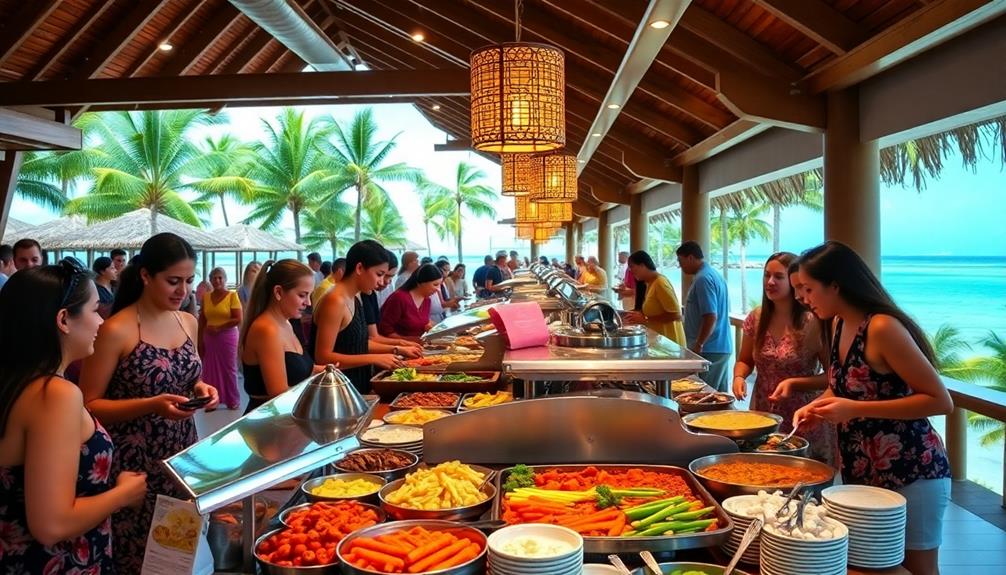
When you're at an all-inclusive resort, understanding your food choices can be a bit tricky. You're surrounded by a dazzling array of options that promise pleasure, but this abundance can often lead to overindulgence. If you have high dietary restraint, you might find yourself caught in a cycle where one slip-up leads to the "What the Hell" effect, prompting you to abandon your dietary goals altogether.
Additionally, the presence of enticing traditional dishes, such as Caldeirada, can further complicate your decision-making process by appealing to your sense of culinary adventure.
During your all-inclusive vacation, the environment plays a notable role in shaping your choices. Attractive food presentations and social settings can tempt you to indulge more than you normally would. The pleasure of self-made food choices feels rewarding, often overshadowing any health considerations.
Moreover, the sheer variety available can create an illusion of control, making you believe you have full autonomy over your eating habits, while in reality, the context and cues around you notably influence your decisions.
Recognizing these factors can help you navigate the buffet, allowing you to enjoy your vacation without compromising your dietary intentions. So, stay mindful of your food choices, and remember that indulgence doesn't have to mean excess.
Impact of Abundance

When you're faced with a buffet overflowing with options, it can be overwhelming, making it hard to make mindful choices.
The variety may evoke thoughts of seasonal dishes like Nettle and Potato Soup, which highlight fresh, local ingredients.
You might feel an illusion of control, believing you can manage your portions despite the abundance around you.
This cognitive overload can lead to overeating and disrupt your usual dietary habits, impacting your overall wellness during your stay.
Cognitive Overload in Buffets
Buffets present a tantalizing array of food options, but this abundance can lead to cognitive overload for many guests. You may find yourself grappling with decision fatigue, struggling to exercise cognitive control amidst countless choices. This overwhelming selection can diminish your ability to make satisfying decisions, often resulting in mindless eating and higher caloric intake.
| Factors | Effects |
|---|---|
| Cognitive Overload | Leads to decision fatigue |
| Excessive Choices | Triggers indulgent behaviors |
| Sensory Overload | Increases likelihood of gluttony |
While a variety of options can enhance your enjoyment, too many choices can create anxiety and dissatisfaction. You might feel compelled to sample everything, only to leave feeling unsatisfied. The paradox of choice suggests that the more options you have, the less likely you are to enjoy the meal. In buffet settings, the illusion of control can further complicate your experience, as you perceive yourself in charge yet often end up overindulging. Ultimately, maneuvering a buffet requires awareness to avoid the pitfalls of cognitive overload.
Illusion of Control
Cognitive overload often leads to a false sense of control in buffet settings, especially in all-inclusive resorts. You might find yourself surrounded by a dazzling array of food options, such as Mushroom Masala and Gobi Manchurian, and this abundance can create an illusion of control over your dietary choices.
With so many dishes to choose from, you may feel empowered to manage your consumption, but the opposite often occurs—overconsumption becomes the norm.
This perception of control can lead you to indulge more freely, driven by the belief that you can easily regulate your intake. However, studies show that this sense of control is misleading; the more you indulge, the less you think about the potential negative health outcomes.
The emotional investment in your vacation, paired with the overwhelming variety of food, intensifies this illusion.
As you navigate the buffet, it's essential to recognize the impact of this abundance on your dietary self-regulation. You might underestimate the risks associated with gluttonous behavior, leading to unhealthy patterns that can affect your overall well-being.
Understanding the illusion of control can help you make more mindful choices during your stay.
Dietary Choices and Abundance
How does the abundance of food options at all-inclusive resorts influence your dietary choices? When you're surrounded by a seemingly endless variety of dishes, it's easy to feel tempted to indulge. This abundance often leads to overconsumption, as you might find yourself eating more than necessary, driven by the illusion of unlimited choices.
Without proper dietary self-regulation, you might ignore your hunger cues and continue to sample everything available, even if you're no longer hungry. For instance, after a big holiday meal, many people find themselves looking for creative ways to use leftovers, like crafting a delicious turkey sandwich or comforting turkey soup, which can also contribute to overindulgence if not mindful.
Research shows that this environment can increase the likelihood of binge eating, especially with the lack of structure in meal choices. Social cues from other vacationers indulging can further exacerbate this behavior, making it hard to resist more than one dessert or an extra helping.
Additionally, the visually appealing presentations and easy access to indulgent foods can push you to consume far beyond your typical eating habits.
While enjoying your vacation, be mindful of how this abundance impacts your health. The unregulated intake of food and drinks might lead to nutrient deficiencies and disrupt your dietary habits long after you leave the resort.
Balancing enjoyment with moderation can help mitigate these risks.
Environmental Influences
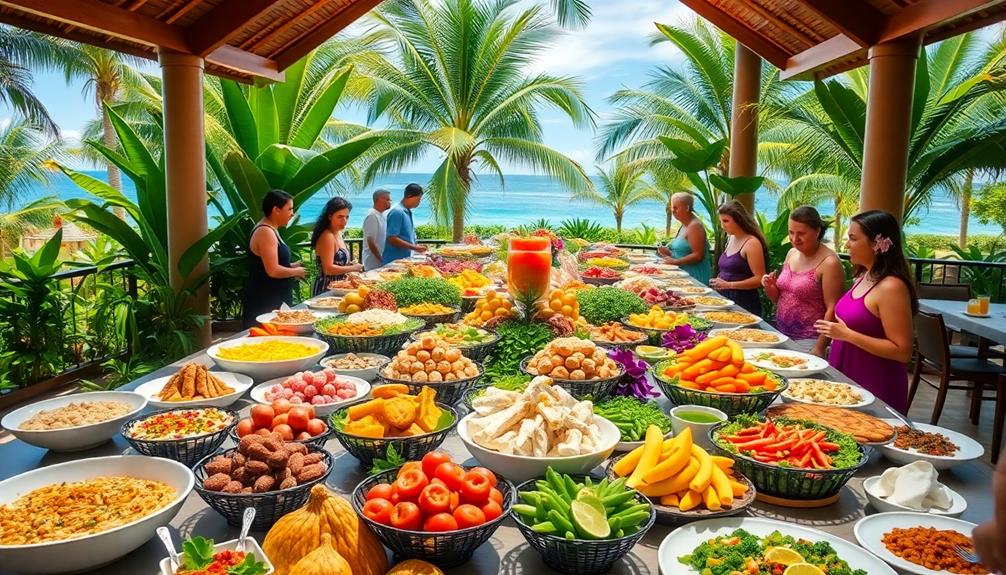
The dining experience in all-inclusive resorts is heavily shaped by environmental influences that can lead to significant changes in your eating habits. Environmental factors play an essential role here, especially the abundance and accessibility of food options.
With so many choices available, it's easy to overindulge, driven by the perception of unlimited availability. For instance, themed food presentations, such as Graveyard Taco Dip, can entice guests to sample more dishes than they normally would. You might find yourself attracted to beautifully presented dishes, encouraging you to try more than you usually would.
Social cues also come into play. When you dine with others or notice fellow guests indulging, it's likely to amplify your own consumption. This communal environment can push you toward overeating, as you subconsciously mirror those around you.
Additionally, the lack of structure in mealtimes can disrupt your usual dietary patterns; eating at odd hours or skipping meals may lead to unhealthy choices later.
Psychological Triggers
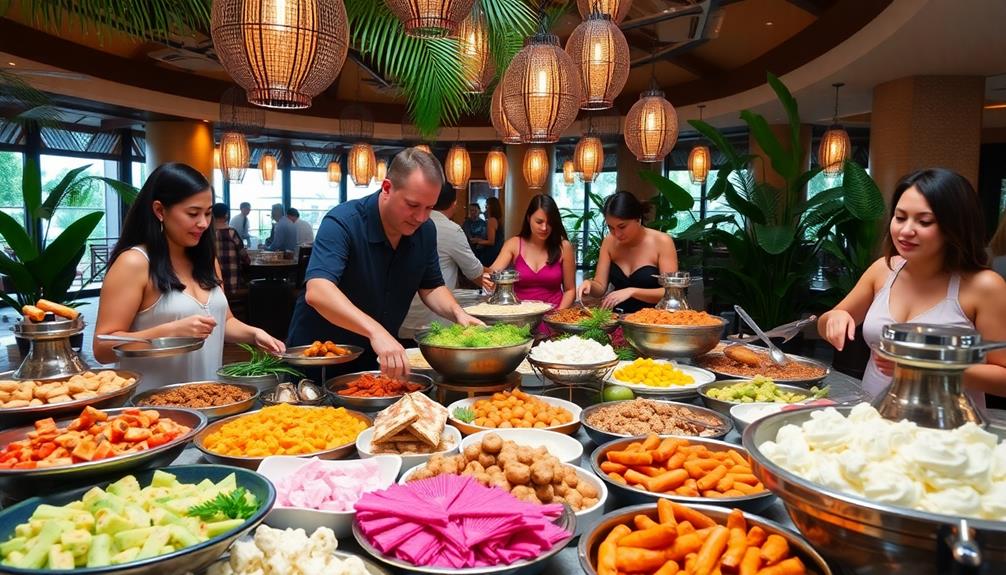
Indulgence often reigns supreme in the dining experiences at all-inclusive resorts, driven by a myriad of psychological triggers that can greatly impact your food choices. The illusion of control often tempts you to overindulge, as the unlimited options create a false sense of empowerment. This feeling can lead to gluttonous behavior, especially when the environment is rich in abundance and visually appealing presentations.
Your emotional state also plays a significant role; the excitement of holidaying amplifies hedonic motives, making self-made decisions around eating more satisfying than those influenced by others. However, cognitive biases like the "What the Hell" effect can complicate matters, especially if you struggle with restrictive eating disorders. A single perceived failure can send you spiraling into excessive consumption.
Here's a quick overview of key psychological triggers:
| Psychological Trigger | Effect on Eating Behavior |
|---|---|
| Illusion of Control | Leads to overindulgence |
| Hedonic Motives | Heightens satisfaction from choices |
| Abundance and Presentation | Influences consumption levels |
| Emotional Investment | Increases perceived stakes of indulgence |
| Cognitive Biases | Can trigger binge-like behavior |
Being aware of these triggers can guide you in making healthier choices during your stay.
Strategies for Mindful Eating
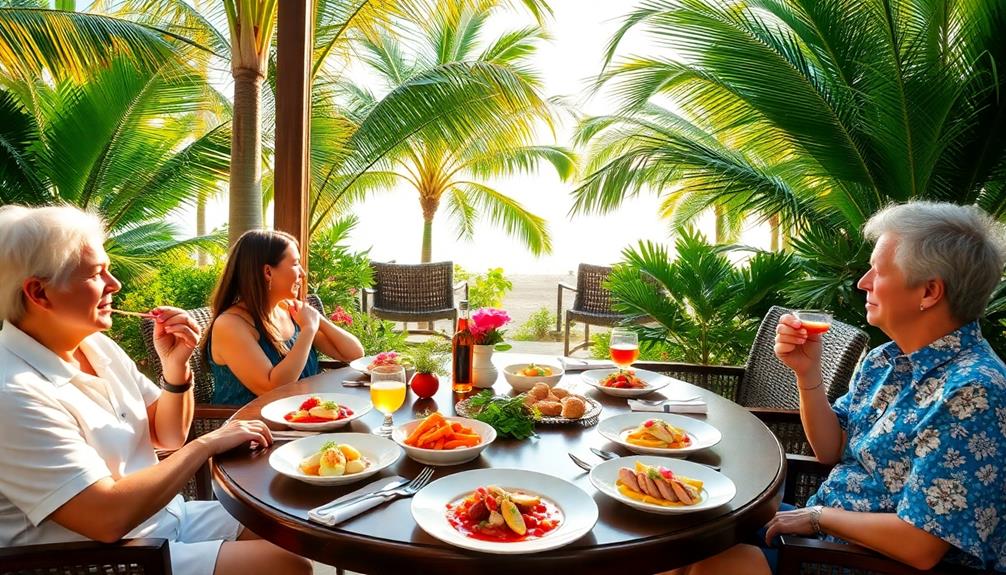
Mindful eating can transform your dining experience at all-inclusive resorts, allowing you to savor each moment rather than succumb to the temptation of overindulgence. Start by being aware of your hunger and satiety cues. This awareness helps you avoid overconsumption and enhances your overall enjoyment of meals.
Incorporating a variety of flavors, such as those found in dishes like Red-Braised Pork Belly, can make each bite more enjoyable and satisfying without the need for large portions.
Utilizing smaller plates and serving sizes promotes portion control, encouraging you to sample a variety of dishes without the risk of overeating. While indulging in the resort's offerings, remember to incorporate healthy options alongside richer meals; this balanced approach enables you to make conscious choices that support your well-being.
Take your time during meals—slow down and savor each bite. Engaging in this practice not only boosts satisfaction but also reduces the likelihood of binge eating behaviors.
Structuring your meal times and incorporating physical activity throughout the day can further help you maintain a healthy balance between calorie intake and expenditure.
The Role of Social Dynamics
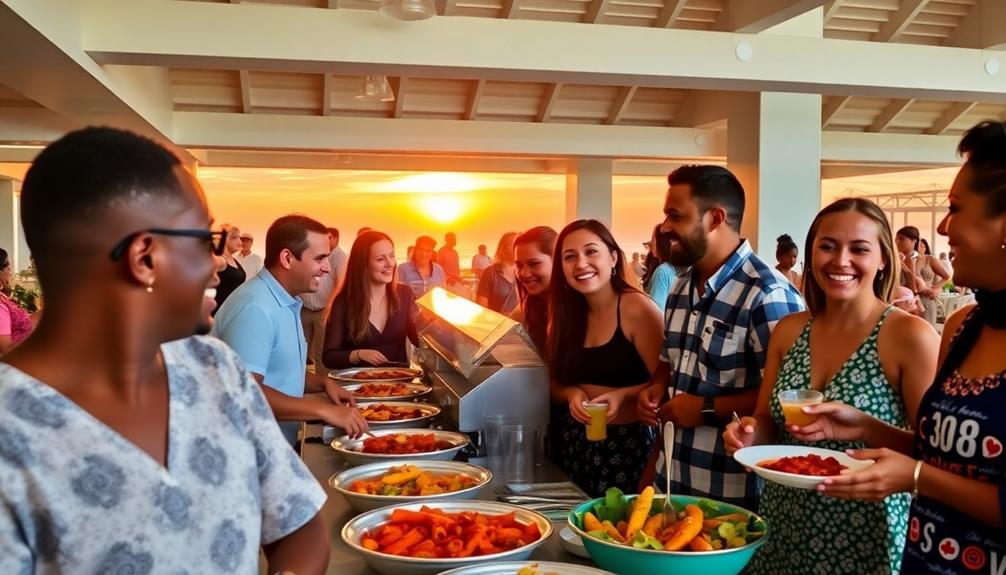
When you're at an all-inclusive resort, the people around you play a big role in your food choices.
Social norms can push you to eat more, especially in group settings where everyone's indulging together. The vibrant offerings, such as Kue Putu and Dadar Gulung, often create a sense of shared experience that can enhance the desire to partake in these delightful treats.
These shared dining experiences often lead to overconsumption, as you might feel compelled to match the behaviors of your peers.
Group Behavior Influence
Social dynamics play a significant role in shaping food choices at all-inclusive resorts, often leading to increased consumption among guests. When you dine with others, group behavior kicks in, and you might find yourself eating more than you usually would.
For instance, sharing dishes like a Graveyard Taco Dip at a communal table can inspire you to indulge in more flavors as you engage with those around you. Research shows that individuals can consume up to 44% more food in social settings compared to when they eat alone. This phenomenon, known as social facilitation, highlights how the eating habits of your peers influence your own portion sizes and selections.
In these communal dining experiences, the emotional connections you share with fellow guests enhance your food enjoyment, making you more likely to indulge.
The environment of all-inclusive resorts, with its attractive food presentations and diverse options, further amplifies these social influences. It can be challenging to maintain dietary self-regulation in such settings, as the enticing choices and shared experiences lead to overeating.
Social Norms and Eating
While dining at all-inclusive resorts, you'll likely notice how your eating habits shift in response to the behaviors of those around you. Social norms play a significant role in shaping your food choices, often nudging you to align your portion sizes with fellow guests.
The vibrant flavors of traditional Mexican dishes, such as Chilaquiles, can further entice you to indulge, as they're often beautifully presented and shared among groups. In communal dining settings, social facilitation kicks in—when you're surrounded by others, you're likely to eat more than you'd alone.
The buffet-style setup, with its abundance of options, can amplify these effects, encouraging you to indulge to match or even exceed the consumption of your peers.
As you share meals, the atmosphere often normalizes overeating, especially in celebratory contexts like vacations. Group cohesion and shared experiences during meals create an environment where indulging becomes a collective activity.
Additionally, environmental cues—like visually appealing food presentations or the layout of dining spaces—can further enhance these social influences on your eating behaviors. All these factors contribute to a higher calorie intake, making it easy to lose track of your usual habits in the delightful chaos of all-inclusive dining.
Shared Dining Experiences
Shared dining experiences at all-inclusive resorts create a vibrant atmosphere that amplifies food consumption. The social dynamics at play encourage you to indulge more than you might when dining alone, often leading to overconsumption.
When surrounded by others, you feel a sense of safety and enjoyment that enhances your meal experience. This communal aspect of dining fosters connections and bonding, further driving your consumption patterns. For instance, the availability of diverse dishes, like Dorayaki (Red Bean Pancake), can entice guests to try new flavors and indulge more.
Here are three key factors to take into account:
- Social Facilitation: Eating in groups often leads you to select higher-calorie, indulgent foods, as the presence of others influences your dietary choices.
- Variety and Control: The wide array of options can create an illusion of control over your food choices, making it easier to indulge beyond your initial intentions.
- Psychological Needs: Shared meals fulfill psychological needs for connection and enjoyment, which can compel you to consume more.
In this environment, the shared dining experience becomes central, reflecting how social interactions considerably impact your eating behaviors and choices during your stay at the resort.
Frequently Asked Questions
How Does Food Work at an All-Inclusive?
At an all-inclusive resort, you enjoy unlimited access to diverse dining options, from buffets to à la carte meals. You can indulge in various cuisines without worrying about individual meal costs, enhancing your overall experience.
Can You Eat Whenever You Want at All-Inclusive Resorts?
At all-inclusive resorts, you can eat whenever you want. Whether it's breakfast, lunch, dinner, or snacks, food is available 24/7, letting you indulge in whatever you crave without worrying about costs.
How Do You Stay on a Diet at an All-Inclusive Resort?
Did you know that nearly 70% of people struggle with portion control at buffets? To stay on a diet at an all-inclusive resort, focus on mindful eating, portion control, and balancing indulgent meals with healthier options.
Does All-Inclusive Mean Food Too?
Yes, all-inclusive typically means food too. You'll enjoy unlimited access to various dining options, allowing you to try different cuisines. Just remember to balance indulgence with moderation to maintain your dietary goals while vacationing.
Conclusion
In all-inclusive resorts, your food choices can be influenced by a mix of abundance, environment, and social dynamics. Just like our ancestors feasted after a successful hunt, you might find it hard to resist indulging when faced with endless options. By recognizing these psychological triggers and employing strategies for mindful eating, you can savor not just the flavors but also the experience. Remember, it's about quality over quantity—so choose wisely and enjoy every bite!
